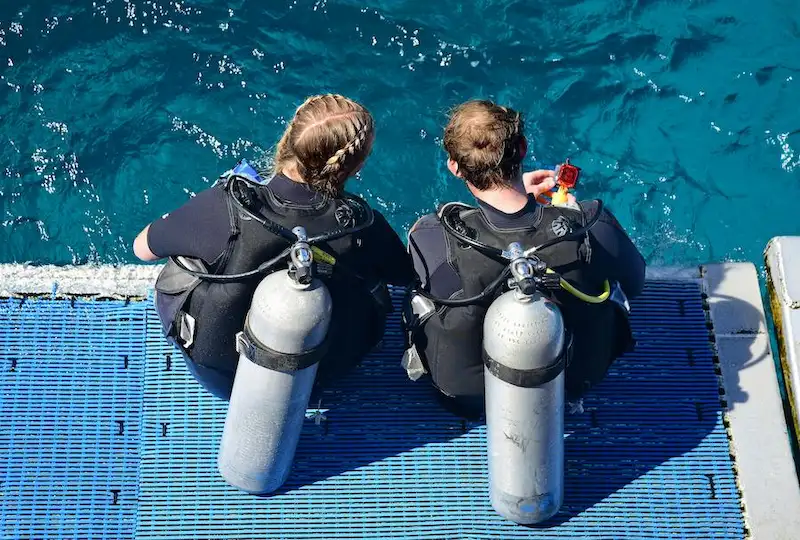Taking a diving certificate course is a great way to gain skills and confidence underwater. Whether you’re a complete beginner or looking to advance your diving knowledge, these courses cater to various levels and interests. Each course not only enhances your diving abilities but also opens up new opportunities for exploration and adventure beneath the waves. Additionally, many advanced certifications can boost your career prospects by qualifying you for higher-paying positions in the diving industry or related fields.
The Origins Of Dive Certifications
In 1959, Jacques Cousteau, renowned French underwater explorer, established the Confédération Mondiale des Activités Subaquatiques (CMAS), pioneering the world’s first scuba diving certification program. This groundbreaking initiative set the foundation for modern scuba training and certification standards.
1. PADI: The Global Leader In Recreational Diving
PADI (Professional Association of Diving Instructors) stands out as the world’s leading recreational diver training organization, renowned for its comprehensive and widely recognized certification courses.
Established in 1966 by John Cronin and Ralph Erickson, PADI has grown into the largest and most prestigious scuba diving agency globally, with over 29 million certifications issued to date. With a network of over 6,600 PADI Dive Centers and Resorts and more than 128,000 PADI Professionals worldwide, PADI offers unmatched access and credibility.
PADI has a wide range of courses designed for divers of all levels and comes along with premium diving tools and technologies for a smooth dive.
PADI’S Open Water Diver Certification
The PADI Open Water Diver certification is the ideal starting point for those new to scuba diving. It provides foundational knowledge and skills, enabling divers to explore the underwater world up to a depth of 18 meters (60 feet) with a dive buddy.
PADI’S Advanced and Specialty Certifications
For those looking to advance, PADI offers a range of courses including Advanced Open Water Diver certifications, specialty courses like deep diving and underwater photography, and the Rescue Diver course.
Professional Certifications From PADI
For career-oriented divers, PADI’s Divemaster and Instructor certifications prepare you for professional roles in the diving industry. PADI also provides technical diving courses, catering to more experienced divers seeking to explore beyond recreational limits.
Although PADI’s course and membership fees are higher compared to some other agencies, the investment is well worth it. PADI’s extensive market presence and professional support offer exceptional career opportunities, whether you’re aiming to become a divemaster, instructor, or advance to a Course Director role.
2. SSI: Comprehensive Scuba Training with a Global Network
Scuba Schools International (SSI) is also a great option for those seeking scuba diving training and certification. SSI has a network of more than 3,500 authorized dealers and 2,500 training locations and is present in over 110 countries.
Established in 1970 by Robert Clark, SSI offers a comprehensive range of programs for divers at all levels. Their popular courses include the Open Water Diver (OWD) for beginners, the Advanced Open Water Diver (AOWD) for experienced divers, and over 30 specialty courses covering various diving disciplines. SSI also provides instructor certifications, from Assistant Instructor to Open Water Instructor.
SSI’s Training Approach
SSI’s training approach, based on the Diver Diamond Methodology, emphasizes safety and skill development. The organization holds Global ISO Certification for many of its programs, reflecting its adherence to international standards.
As a founding member of the Recreational Scuba Training Council (RSTC), SSI participates in various national committees to advance the diving community. Its global reach and commitment to quality education make SSI a top choice for both recreational divers and aspiring dive professionals.
SSI also offers a robust eLearning platform, allowing students to complete the theoretical portions of their courses online at their own pace, which complements the in-water training conducted with certified instructors. This online option makes diving education more accessible and adaptable to individual schedules.
3. SDI: Advanced Training for Technical Divers
If you’re drawn to the allure of extreme underwater exploration and are considering becoming a technical diver, Scuba Diving International (SDI) stands out as an exceptional choice.
As part of International Training, which also includes Technical Diving International (TDI)—the world’s largest technical diving agency—SDI offers a robust pathway into the realm of advanced diving. Established in 1998 as TDI’s recreational division, SDI is deeply embedded in the technical diving community. Many SDI instructors also hold TDI credentials, ensuring that foundational skills are taught with an eye toward advanced diving practices.
Open Water and Specialty Courses
The entry-level Open Water Scuba Diver course by SDI features a blend of theoretical e-learning, practical pool sessions, and open water dives. SDI is renowned for its pioneering spirit, having introduced a range of innovative online specialties such as Wreck Diving, Computer Nitrox, Deep Diving, and Navigation.
They were also trailblazers in developing diving programs for children and in allowing divers to learn using dive computers instead of traditional dive tables. For those who push the limits, SDI’s Solo Diver qualification is the first and only insured program that trains divers to operate independently of the traditional buddy system.
SDI offers additional recreational specialties that build a strong foundation for technical diving. These courses include Advanced Buoyancy Control, Nitrox, Deep Diving, Sidemount, Full Face Mask, and Equipment Specialist training.
SDI’s Global Reach and Career Opportunities
SDI has training centers in over 100 countries and is affiliated with organizations like Emergency Response Diving International (ERDI) and Performance Freediving International (PFI). These connections provide SDI’s divers with diverse opportunities for specialized diving and career advancement.
4. CMAS Diver Certification: A Structured Approach
The CMAS (Confédération Mondiale des Activités Subaquatiques) International Diver Training Certification System provides a highly structured approach to scuba diving education. This system is recognized worldwide for its comprehensive and rigorous training standards.
The CMAS program features a tiered certification system with distinct levels, including One Star, Two Star, and Three Star Diver certifications. Each level has specific training milestones and competencies that divers must achieve to advance.
What makes this program unique is that unlike agencies such as PADI that provide flexible training methods and a more standardized approach, CMAS emphasizes a disciplined structure with detailed requirements for each level. CMAS certifications are particularly valued in Europe but are also accepted globally, catering to divers who seek a rigorous, instructor-led training experience.
CMAS Comparison With other Agencies
While CMAS shares goals with PADI and SSI in promoting safe diving practices and offering specialty courses, it distinguishes itself through its European roots and a focus on instructor-supervised training. CMAS’s training philosophy is grounded in safety and competence, often requiring more extensive training dives compared to the more practice-focused approach of PADI’s “Comfort Through Repetition.”
This structured approach ensures that divers receive thorough preparation. As a result, CMAS is a robust choice for those seeking comprehensive and globally recognized qualifications in their diving career.
Choosing the right scuba certification program depends on your goals and preferences. Each agency has unique strengths, so selecting the one that aligns with your diving aspirations will set you on the path to achieving your underwater ambitions.



